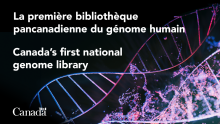In the tropical, temperate forests it calls home, the velvet worm uses a projectile “slime” to capture its prey. When it’s ejected from the worm, the slime transforms into a gel before solidifying into stiff fibers upon exposure to air. This forms an inescapable trap for struggling prey. "The fact that the slime transitions from a liquid to a solid in mid-air is extremely unusual," said Professor Matthew Harrington, co-director of the McGill Institute for Advanced Materials. “It appears that the forces it experiences when ejected initiate the transition.”


Today at the McGill Genome Centre, the Honourable Mark Holland, Minister of Health, announced a $15M investment over five years to create a Pan-Canadian Genome Library (PCGL), which will allow for easier sharing of genomic data across the country, and aid in the development of a national strategy to capture, store and access Canadian data in an equitable, secure, and sustainable manner. The funding comes from the Canadian Institutes of Health Research and builds on investments from the Government of Canada’s Drugs for Rare Diseases Strategy.

Sunscreen usage is climbing, but so are melanoma and skin cancer rates: this, researchers say, is the sunscreen paradox.
“The problem is that people use sunscreen as a ‘permission slip’ to tan,” said Dr. Ivan Litvinov, an Associate Professor in the Department of Medicine and Chair of the Dermatology Division at McGill University and co-author with Dr. Sandra Peláez, Dr. Richie Jeremian and Dr. Pingxing Xie of two recent studies that explore the sunscreen paradox.

Research on the trillions of microorganisms that make up a person’s microbiome can lead to medical breakthroughs to treat diseases like inflammatory bowel syndrome and diabetes. According to Alyssa Bader, a Tsimshian Assistant Professor in the Department of Anthropology at McGill University, microbiome samples from Indigenous communities have the potential to further Western medicine, but those same communities often have been excluded from the research process and may miss out on the benefits that result from their contributions to science.

Both elegant and fierce, killer whales are some of the oceans’ top predators, but even they can be exposed to environmental pollution. Now, in the largest study to date on North Atlantic killer whales, researchers in the American Chemical Society’ Environmental Science & Technology report the levels of legacy and emerging pollutants in 162 individuals’ blubber. The animals’ diet, rather than location, greatly impacted contaminant levels and potential health risks — information that’s helpful to conservation efforts.

The McGill University Library is now home to a rare collection of materials related to the prolific Enlightenment period philosopher, Voltaire (1694-1778).
This estate gift, entrusted to McGill by Professor Peter Lambert-David Southam, is a treasure trove of historical handwritten documents, some written by Voltaire himself, consisting of letters, poems, essays, memoirs, notes, legal documents, trial testimonies, and architectural drawings – many of which have never been published before. It offers a unique window into the life and mind of Voltaire.

As the planet gets hotter, the need for cool living environments is becoming more urgent. But air conditioning is a major contributor to global warming since units use potent greenhouse gases and lots of energy.
Now, researchers from McGill University, UCLA and Princeton have found in a new study an inexpensive, sustainable alternative to mechanical cooling with refrigerants in hot and arid climates, and a way to mitigate dangerous heat waves during electricity blackouts.

A team of astronomers has made a leap forward in our understanding of the intriguing TRAPPIST-1 exoplanetary system. Not only has their research shed light on the nature of TRAPPIST-1 b, the exoplanet orbiting closest to the system’s star, but it has also shown the importance of parent stars when studying exoplanets.
NSERC Alliance Grant supports McGill-led Canadian team, new global climate center on AI for biodiversity change
The FRQS Dual AI Chairs Program supports research collaborations across disciplines in pursuit of the significant potential of AI to address some of humanity’s greatest health challenges.

Despite growing awareness about the high rates of suicide among men, research is still needed to examine men’s mental health challenges. Existential psychology, with its focus on questions of meaning and value, may bring new insights that can aid in this examination.

Machine learning tutors affect learners in unforeseen ways, both positive and negative
Virtual reality simulators can help learners improve their technical skills faster and with no risk to patients. In the field of neurosurgery, they allow medical students to practice complex operations before using a scalpel on a real patient. When combined with artificial intelligence, these tutoring systems can offer tailored feedback like a human instructor, identifying areas where the students need to improve and making suggestions on how to achieve expert performance.

Music is a collective experience that binds people together. From orchestral play to audiences handclapping, synchronization lays the foundation for all musical interactions. But what explains our ability to get in sync with someone or act in lock step with a group?

Ten students have been named McGill University’s recipients of the prestigious Schulich Leader Scholarship, Canada’s largest Science, Technology, Engineering and Math (STEM) scholarship.
McGill graduate Seymour Schulich, BSc’61, MBA’65, DLitt’04, an entrepreneur and one of Canada’s leading philanthropists, created the scholarship fund in 2012 to encourage outstanding entrepreneurial-minded students on their paths to becoming technology innovators.
Today, The Royal Society of Canada (RSC) announced 101 new Fellows and 58 new Members of the College of New Scholars, Artists, and Scientists. Among the 2023 cohort are nineteen McGill researchers and scholars, including fifteen RSC Fellows and four new Members, who will be inducted at the RSC Celebration of Excellence and Engagement (COEE) on November 16 and 17, 2023, in Waterloo, Ontario.
